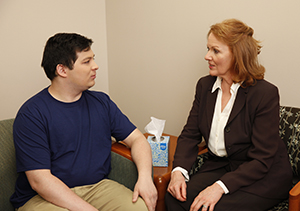Understanding Anxiety Disorders
Understanding Anxiety Disorders
Almost everyone gets nervous now and then. It’s normal to have knots in your stomach before a test, or for your heart to race on a first date. But an anxiety disorder is much more than a case of nerves. In fact, its symptoms may be overwhelming. But treatment can relieve many of these symptoms. Talking to your healthcare provider is the first step.
What are anxiety disorders?
An anxiety disorder causes intense feelings of panic and fear. These feelings may arise for no apparent reason. And they tend to recur again and again. They may prevent you from coping with life and cause you great distress. As a result, you may avoid anything that triggers your fear. In extreme cases, you may never leave the house. Anxiety disorders may cause other symptoms, such as:
Obsessive thoughts you can’t control
Constant nightmares or painful thoughts of the past
Nausea, sweating, and muscle tension
Trouble sleeping or concentrating
What causes anxiety disorders?
Anxiety disorders tend to run in families. For some people, childhood abuse or neglect may play a role. For others, stressful life events or trauma may trigger anxiety disorders. Anxiety can trigger low self-esteem and poor coping skills.
Common anxiety disorders
Panic disorder. This causes an intense fear of being in danger.
Phobias. These are extreme fears of certain objects, places, or events.
Obsessive-compulsive disorder. This causes you to have unwanted thoughts and urges. You also may perform certain actions over and over.
Posttraumatic stress disorder. This occurs in people who have survived a terrible ordeal. It can cause nightmares and flashbacks about the event.
Generalized anxiety disorder. This causes constant worry that can greatly disrupt your life.
Getting better
You may believe that nothing can help you. Or, you might fear what others may think. But most anxiety symptoms can be eased. Having an anxiety disorder is nothing to be ashamed of. Most people do best with treatment that combines medicine and therapy. These aren’t cures. But they can help you live a healthier life.
Updated:
February 21, 2018
Reviewed By:
Ballas, Paul, DO,Image Reviewed by Staywell medical art team.,Nelson, Gail A., MS, APRN, BC
